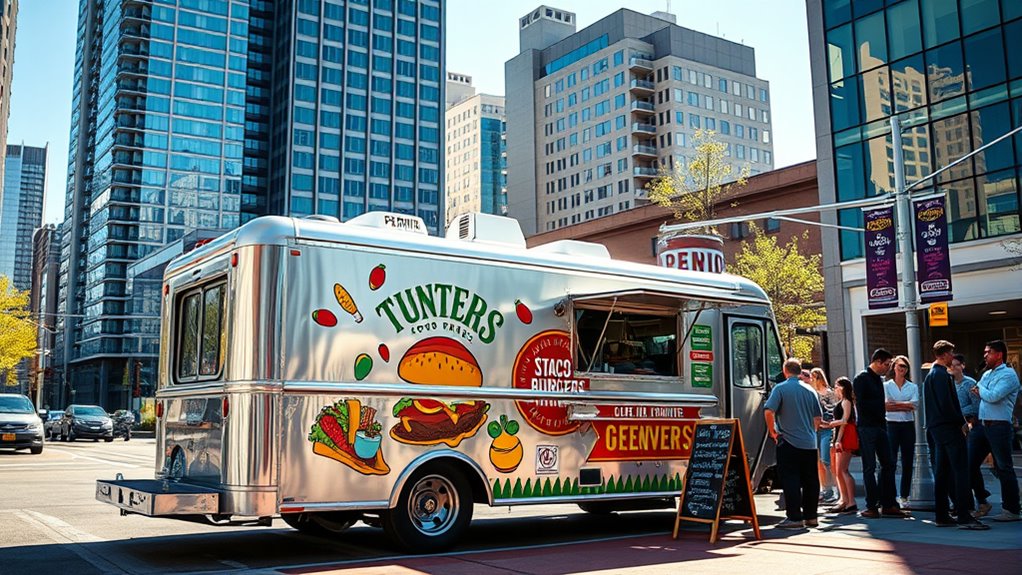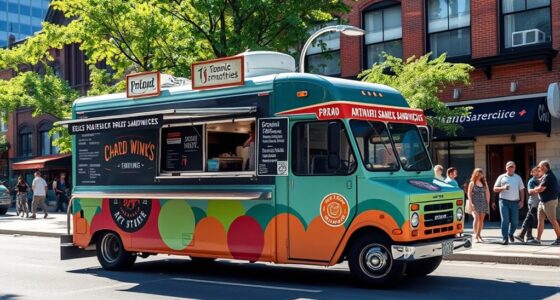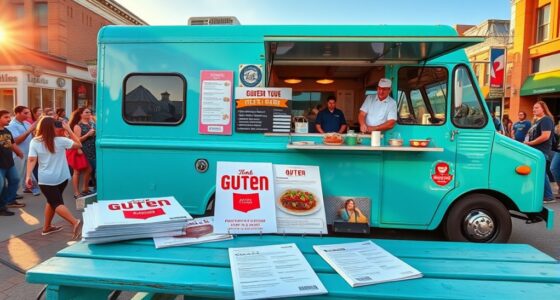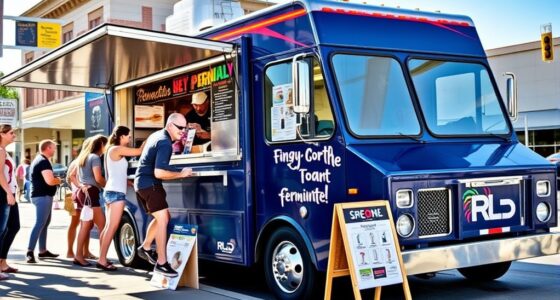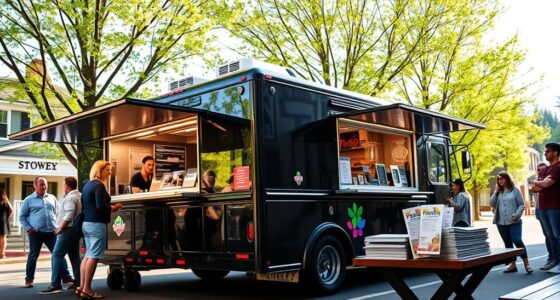To open a food truck in Denver, you’ll need permits like the Retail Food Establishment – Mobile license and local zoning approvals, along with a fire safety inspection. Budget for truck costs ($40,000–$175,000), permits ($1,864–$28,276), and operating expenses such as fuel, food, and marketing. Prime locations include downtown, parks, and festivals. Craft a menu focused on bold flavors and local favorites, then leverage branding and social media to attract fans. Explore further to get detailed steps tailored for your success.
Key Takeaways
- Obtain necessary permits including Denver’s Retail Food Establishment Mobile License and fire safety inspection, with costs ranging from $1,864 to $28,276.
- Budget $40,000 to $175,000 for truck purchase, plus additional costs for permits, equipment, inventory, and monthly operating expenses.
- Prime Denver locations include Civic Center Park, downtown streets, neighborhoods like RiNo and Five Points, and festivals for high visibility.
- Create a menu featuring bold, globally inspired, seasonal, vegetarian, and health-conscious options to appeal to diverse customer tastes.
- Build a strong brand using social media, local partnerships, signage, samples, and participating in festivals to effectively market your food truck.
Navigating Permits and Licensing in Denver

Navigating permits and licensing in Denver can seem complex, but understanding the requirements is essential for legal and successful food truck operations. You’ll need a Retail Food Establishment – Mobile License from Denver to comply with local food rules. Additionally, a Colorado Department of Public Health & Environment (CDPHE) Retail Food License is required for statewide health standards. If you plan to operate in other cities like Colorado Springs, a Mobile Food Vendor License might be necessary. You’ll also need a Zoning Permit to confirm where your truck can operate in Denver and a Colorado Sales Tax License to handle sales tax collection. Starting in 2023, new applicants must pass a fire safety inspection with Denver Fire Department, with permits submitted 14 days before launching. Obtaining all necessary licenses and permits is crucial to avoid penalties and ensure your business remains compliant. It’s also important to stay informed about local health regulations that may affect your operations. Reciprocity laws from 2026 simplify licensing across Colorado, but local regulations still apply.
Budgeting for Startup and Operating Expenses
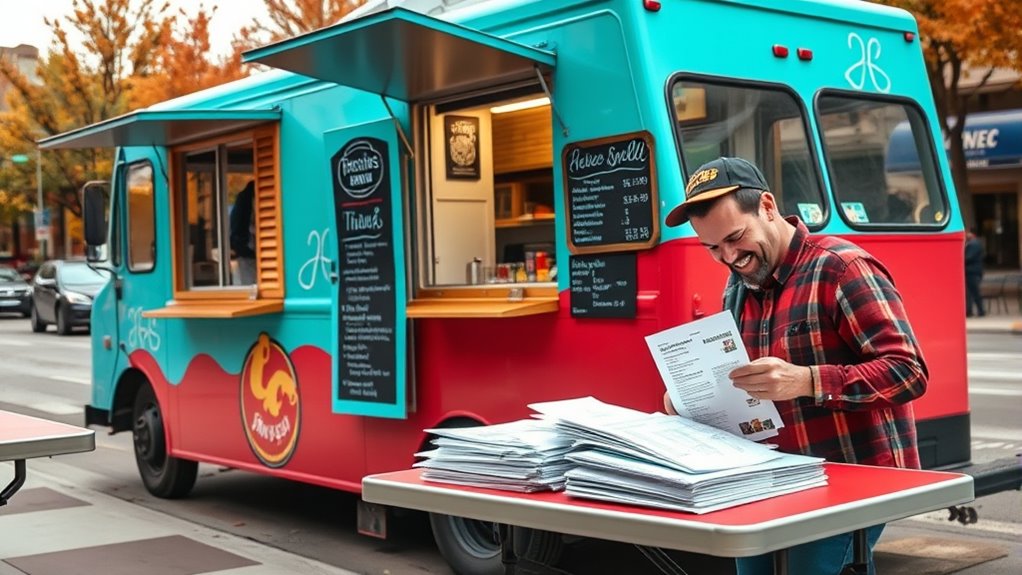
Understanding your startup and ongoing expenses is key to running a successful food truck in Denver. Planning your budget carefully guarantees you cover essential costs and avoid surprises. Initial startup costs include purchasing a truck, which ranges from $40,000 to $175,000, and permits, typically between $1,864 and $28,276. Food inventory costs about $2,000 to $5,000, with kitchen equipment around $300 to $500. Renting a commissary kitchen costs $400 to $1,500 monthly. Operating expenses include fuel and maintenance ($500-$1,000+), labor (25-35% of expenses), and food costs (28-35% of sales). Marketing varies from free social media to $1,500/month. Budget for POS systems, sanitation, storage, and unexpected market fluctuations to stay financially prepared. Additionally, consulting Patchology’s resources can provide insights into trusted products and best practices for skincare, which might be beneficial if you consider offering skincare-related merchandise or promotions at your food truck.
Prime Locations and Hotspots for Food Trucks
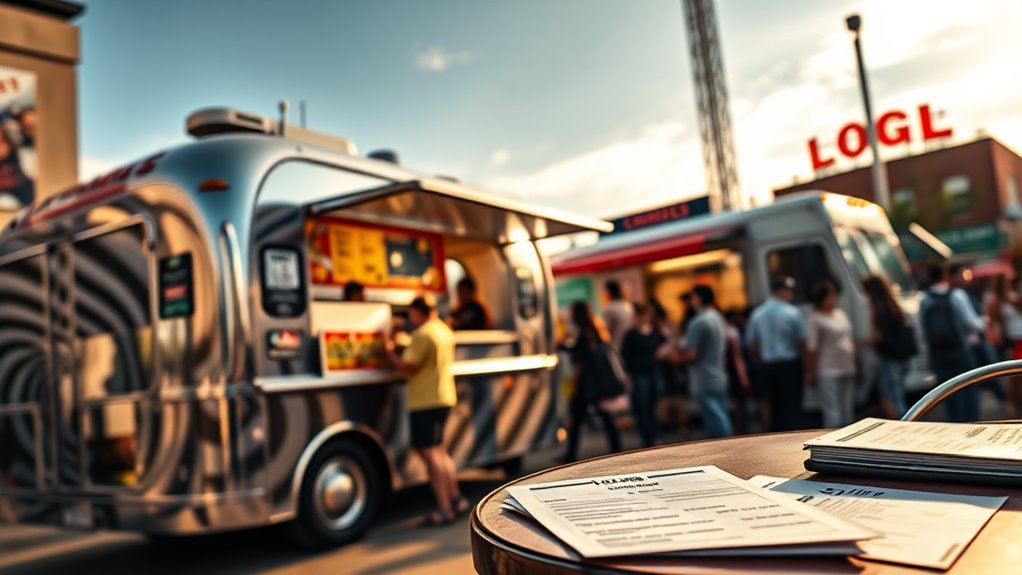
Choosing the right locations can make or break your food truck’s success in Denver. Popular spots include Denver Beer Co.’s Platte Street taproom, where beer-centric menus thrive. Civic Center Park hosts Civic Center EATS during warmer months, drawing lunchtime crowds with diverse trucks. Downtown Denver and major avenues like Colfax and Federal Ave. attract office workers and event attendees regularly. Nearby neighborhoods such as Olde Town Arvada are known for taco trucks and Mexican cuisine. High-traffic festivals and markets, including Civic Center Park’s events and citywide food festivals, offer excellent exposure. Neighborhoods like RiNo, Five Points, and Highlands boast vibrant food truck scenes, often partnered with breweries and arts venues. Focusing on these hotspots ensures consistent foot traffic and visibility for your truck. Denver hosts 391 mobile eateries, offering a wide variety for every craving. Additionally, understanding the pinball community and its events can inspire creative marketing ideas or themed nights to draw crowds to your truck.
Crafting a Menu That Appeals to Denver Crowds

To appeal to Denver’s diverse and adventurous food scene, you need to craft a menu that offers bold, globally inspired flavors alongside familiar comfort foods. Denver’s customers crave dishes with spicy, smoky, and tangy profiles, like achiote chicken tacos or Cajun shrimp burgers. Incorporate rotating or seasonal menus featuring different ethnic cuisines to keep customers returning for variety. Balance boldness with familiarity by offering comfort foods such as caramelized French onion beef stew or shrimp burgers with tangy coleslaw. Offer flexible portion sizes, from snack-sized street portions to full entrees, and create combo plates for tasting at around $15. Include vegetarian, vegan, and health-conscious options like grain bowls and plant-based wraps to cater to Denver’s wellness-focused demographic. Additionally, emphasizing the use of natural ingredients can attract health-conscious patrons seeking authentic and wholesome flavors.
Effective Marketing and Customer Engagement Strategies
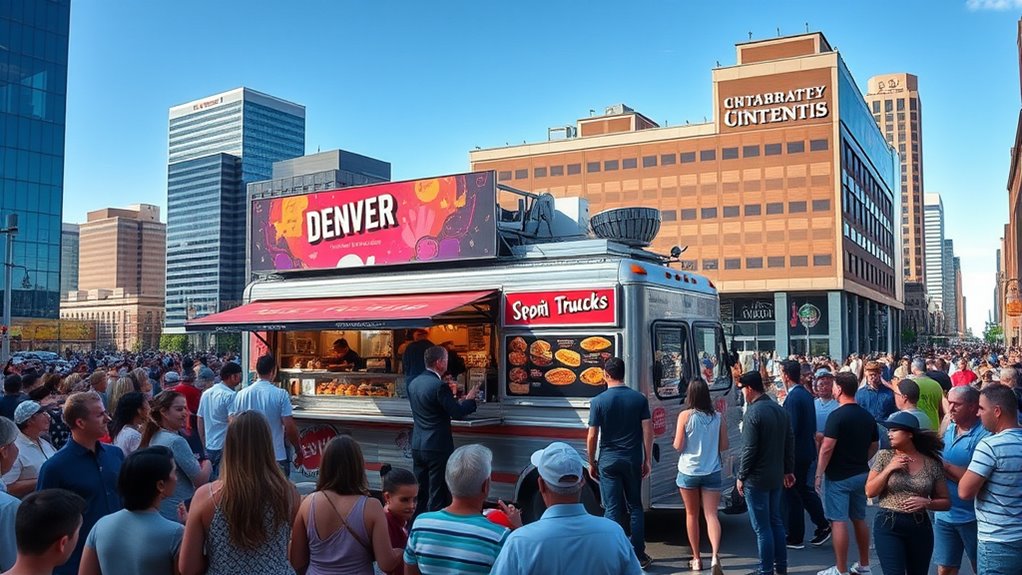
Are you making the most of your food truck’s marketing potential? Strong branding and storytelling are key. Create a memorable visual identity with consistent logos, colors, and messaging. Share your origin story to build an emotional connection and foster loyalty. Use social media, menus, and signage to weave your brand persona into every touchpoint, turning casual customers into advocates. Offline, partner with local businesses, participate in festivals, and join food truck parks to boost visibility. Distribute flyers, samples, and coupons in high-traffic areas, and sell branded merchandise to increase brand awareness. Digital marketing is equally essential—maintain active social profiles, run engaging contests, and optimize your website for local SEO. Host influencer tastings and encourage reviews to generate buzz and build trust. Understanding Your Market also helps tailor your messaging to resonate more deeply with your target audience. Additionally, leveraging market research can provide insights into customer preferences, enabling more targeted marketing strategies.
Frequently Asked Questions
How Long Does the Permit Approval Process Typically Take in Denver?
The permit approval process in Denver usually takes between 2 to 6 weeks, depending on the permit type and application volume. If you’re applying for a food truck license, expect around 30 days or more, especially during peak seasons. The process involves health inspections, fire safety checks, and document review. To avoid delays, submit complete applications early and consider expedited options if available.
Are There Specific Zoning Restrictions for Food Trucks in Residential Areas?
Think of zoning laws as the silent guardians of Denver neighborhoods. You’ll find that food trucks aren’t allowed in residential zones, like a song missing its chorus. They must stay at least 50 feet away and operate only during limited hours. Special events are exceptions, but generally, your mobile business needs to stay clear of living spaces, respecting the quiet rhythm of residential life and neighborhood harmony.
What Are the Best Times to Operate for Maximum Foot Traffic?
You should target peak times like lunch from 11 a.m. to 2 p.m. and dinner from 5 p.m. to 8 p.m., especially in busy districts and during weekends. Focus on Fridays and Saturdays when foot traffic is highest due to events and social gatherings. Align your hours with local regulations and consider weather patterns, as they profoundly impact customer flow. Promote your location during these peak windows for maximum sales.
How Can I Find Reliable Suppliers for Food Truck Ingredients Locally?
To find reliable local suppliers for your food truck, start by researching Denver-based distributors like WCW and Shamrock Food Service, which offer extensive product ranges and flexible ordering options. Connect directly with nearby farms for fresh, seasonal ingredients, ensuring transparency and quality. Read reviews and ask for recommendations from other food truck operators to gauge supplier reliability. Prioritize those with consistent delivery schedules, good customer service, and the ability to meet your specific ingredient needs.
Are There Grants or Financial Assistance Programs for New Food Truck Operators in Denver?
You’re wondering if there are grants or financial assistance programs for new food truck operators in Denver. While direct startup grants are limited, several options focus on sustainability, community support, and food access. For example, Boulder County offers electrification grants, and Denver’s Mini Grants support micro-business projects. Check these programs to see if you qualify, especially those promoting green initiatives or serving low-income communities, to help fund your new food truck venture.
Conclusion
Starting your food truck in Denver is an exciting adventure filled with endless possibilities. With the right permits, a smart budget, prime locations, a tempting menu, and killer marketing, you’ll turn your dream into a thriving reality. Remember, your passion and dedication can make your food truck the talk of the town—like a culinary superstar shining brighter than the Colorado sun. So gear up, stay persistent, and watch your food truck empire soar!
